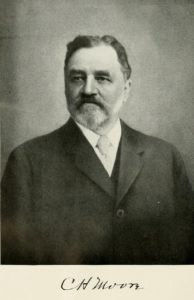 The great American lumber industry, in all its ramifications, owes more to the New England states for its active personnel than to any other section of the country. It was in the old pine tree state of Maine that Charles H. Moore of Galveston had his origin. Among lumber manufacturers of the south, few have been longer or more prominently connected with the industry than Charles H. Moore. He was one of the first to establish a factory for lumber products in south Texas, after the war. Forty years of his career were devoted to the varied enterprises of lumbering and manufacture, and he is still connected officially with four large industrial companies. Charles H. Moore was born at Freeport, Cumberland county, Maine, August 10, 1842, a son of Ira and Martha (Doe) Moore. His father was also born in Maine, as was likewise the mother, and was a farmer and school teacher. His death occurred in 1865, while the mother passed away in 1869.
The great American lumber industry, in all its ramifications, owes more to the New England states for its active personnel than to any other section of the country. It was in the old pine tree state of Maine that Charles H. Moore of Galveston had his origin. Among lumber manufacturers of the south, few have been longer or more prominently connected with the industry than Charles H. Moore. He was one of the first to establish a factory for lumber products in south Texas, after the war. Forty years of his career were devoted to the varied enterprises of lumbering and manufacture, and he is still connected officially with four large industrial companies. Charles H. Moore was born at Freeport, Cumberland county, Maine, August 10, 1842, a son of Ira and Martha (Doe) Moore. His father was also born in Maine, as was likewise the mother, and was a farmer and school teacher. His death occurred in 1865, while the mother passed away in 1869.
It was in the country and village schools of York county, Maine, that Charles H. Moore received his first training for life. For a short time he followed in the footsteps of his father and taught school, but his ambition was for a more active career in the industrial and commercial life which absorbed the energies of Americans during the latter half of the nineteenth century. From the extreme northeast he went clear across the continent, and in 1862 located in California, where he became an employee of his uncles, B. and J. S. Doe, manufacturers of sash, doors and blinds. This was his real introduction to lumber manufacturing. When ready to engage in business for himself, he chose as a location the southern belt of the great American forest areas, and thus located at Galveston in March, 1867. There, under the name of C. H. Moore & Company, he established a factory for the making of interior woodwork, and, as already stated, was one of the first manufacturers of lumber materials to go into business at Galveston after the resumption of normal conditions following the war. The first factory was a small one, but it proprietor possessed the ability and enterprise sufficient to develop the undertaking on a large scale, and for a number of years his firm was an important factor in local manufacturing circles. Now for more than forty years Mr. Moore has retained a large share in the lumber industry of the south, and credit is due him for a share in the pioneer development of lumbering, especially in Texas and Louisiana.
The firm of C. H. Moore & Company continued actively until 1876. Mr. Moore then engaged in the general lumber business in the firm of W. F. Stewart & Company, and, selling out his interests with that firm in 1880, he joined A. J. Perkins of Lake Charles, Louisiana. A. J. Perkins & Company continued until the death of Mr. Perkins in 1893. The firm then became Moore & Goodman, and that name is still prominent among lumber circles of Texas. Mr. Moore retired from active participation in the firm in 1907, and his sons, Kilburn and Bartlett D., have since taken his place, in association with Mr. Goodman.
The activity of Mr. Moore in business affairs is indicated further by his connection with the following concerns: Vice president of the Lock-Moore Company, president of the Edgewood Land & Logging Company, vice president of the Texas Bank & Trust Company, vice president of the Texas Gulf Steamship Company, vice president of the American Indemnity Company, director of the First National Bank of Galveston, director of the Doe Estates Company of San Francisco, and a member of the firm of Guyton & Moore, fuel oil dealers. In politics Mr. Moore is a Democrat, and is affiliated with the Lumberman’s organization, the Hoo Hoos, and the Benevolent and Protective Order of Elks at Galveston. In 1871 he married Miss Ida Kilburn, daughter of Wells Kilburn of Napa California. Their two children are Kilburn and Bartlett D. The Moore home in Galveston is 2722 Avenue H.
Source: Frank W. Johnson, A History of Texas and Texans (Chicago and New York: The American Historical Society, 1914), Vol. IV, p. 1595.
